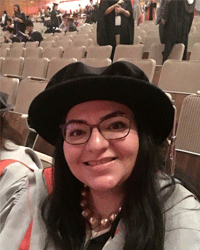Women's History Month: Enas Newire
Posted on March 8, 2024 by Microbiology Society
Women’s History Month takes place annually throughout the month of March. It aims to highlight and reflect on the many, but often over-looked achievements made by women throughout history – which has paved the way of opportunities for the women of today. To mark the month, we caught up with Society Champion, Enas Newire, to discuss her insights as a woman in STEM.

Could you tell me a bit more about yourself?
My name is Enas Newire and I am a lecturer in medical microbiology at Middlesex University, UK. My research involves investigating, understanding and combatting antimicrobial resistance (AMR). My research activities focus on AMR emergence and dissemination through horizontal gene transfer (HGT) amongst bacteria – particularly bacterial evolutionary studies; bacterial plasmid transfer and fitness studies; CRISPR-Cas system identification, anti-plasmid activity and bioinformatic analysis of bacterial genome sequences. I also evaluate new antimicrobials efficacy, resistance and spectrum of anti-plasmid activity.
The month of March is Women’s History Month, are you doing anything this year to raise awareness?
Yes, I am attending the Middlesex University Global Women's Breakfast and I am hopefully going to spread awareness in the local academic communities.
Biochemist, Marjory Stephenson co-founded the Microbiology Society in 1945 – how does Women’s History inspire you, and why do you think it’s important to highlight women’s history?
Women in academia, especially microbiologists, tend to be under a massive pressure that leads to the ‘leaky pipeline’ phenomenon. A lot of academic women inspire me and the 2020 documentary, Picture a Scientist, highlights gender inequality in science. Making a change to this is what motivates me the most.
What advice would you give other women considering a career in STEM?
My advice would be to go for it! However, to do STEM, you need to have a passion and devotion for it. It is a demanding career and typically not just a ‘9 to 5’ job, especially within academia. Therefore, your own drivers and motivation need to keep you enjoying and thriving within it.
I also think that a lot needs to be done in terms of engaging more young women into the wide array of STEM career paths. Sometimes the media stereotypes female scientists, often portraying them as nerds wearing glasses, which is far from reality. This image remains in the minds of young girls and can contribute to STEM career paths appearing less attractive to them.
Do you think it helps to have any role models?
Yes, it is important to have role models to look up to. I was lucky to grow up witnessing many role models in my life. Perhaps, the first role model who inspired me most to become an academic was my father (who was an academic in a different field). Within my field, I had the honour to be supervised by academics who inspired me throughout my postgraduate education and beyond.
What has been the greatest accomplishment in your career so far?
I am proud of having discovered a plasmid-borne CRISPR-Cas system (Type IV-A CRISPR-Cas) that targets other resistance plasmids, suggesting a role in inter-plasmid competition (publication: PMID 32903441).
How would you like to inspire other women in the future?
I would like to raise awareness of the inequalities in academia, exhibit a model for younger women and support them to grow into STEM. This could include going beyond academia to do outreach projects in secondary schools.
What do you hope to achieve in your career in the future?
As an early career researcher, there is a lot to achieve in terms of research, grants and publishing. I also hope to establish a wider network which would create a supportive research environment.
Could you tell us why you have decided to join the Society and become a Champion?
The Microbiology Society is the most relevant international society in my field that exists in the UK. Additionally, the initiatives that the Microbiology Society is leading in the area of AMR (e.g. Knocking out AMR) is impressive. As a member of the Prokaryotic Committee, being able to vote on the specific sessions/symposium, gives me a great opportunity to contribute, as well as to learn new directions in science. Lastly, being a Champion provides me with an opportunity to engage younger generations who are interested in STEM, microbiology, AMR and academia.
If you are also interested in joining one of our Divisions, or getting more involved with other Society activities, find out more via our Get Involved hub.
